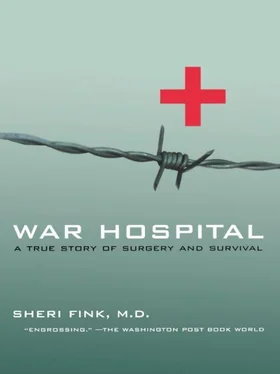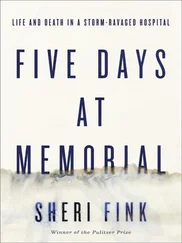But change seeped into the health clinic building, too. Serb doctors in the clinic began to chill toward their non-Serb colleagues and complain of discrimination. Muslims pointed out that although Serbs constituted a minority in the city leadership, a Serb doctor had been allowed to keep his position as director of the health clinic. A few minor incidents ensued; workplace conflicts, allocation of medical specialization positions, and the assignment of free apartments were sometimes chalked up to “he got it because he’s a Muslim.” Serbs alleged that a cabal of “Muslim fundamentalist intellectuals” was active at the Srebrenica health clinic.
In early 1992, Ilijaz still lived in Bratunac and worked at the Srebrenica health center. Fatima also lived in Bratunac and worked at the health center there. She was more confident than ever that the two of them were meant to be together. Ilijaz, feeling stifled, was not as sure.
Before long, he had something much more serious to preoccupy him; his father was diagnosed with lung cancer. Ilijaz brought him to the capital, Sarajevo, to undergo chemotherapy and prepare for possible surgery. With the stresses of his father’s illness, his job, and his changing relationship with Fatima, Ilijaz spent little time thinking about a potential war in Bosnia . He considered the few incidences of violence and increasing lawlessness a political problem that the Yugoslav army, the JNA, was going to solve. But when actual fighting broke out around Bosnia, and many people fled Srebrenica, he could ignore it no longer.
Doctors began failing to show up for work, and fewer and fewer patients came to his clinic. Some of Ilijaz’s friends urged him to join them in leaving the area. As an unmarried man with a car and money, Ilijaz could go wherever he wanted. He knew that most of the clever people in town were leaving, but that was their idea, not his. He wasn’t ready to make such a major decision.
Roadblocks flew up on country roads and city streets, manned by the tense citizens who lived on them. They checked cars and people for guns, raising more fear than security. Patients at Srebrenica’s historic health spa were collected in a minivan, and a Muslim maintenance worker at the spa volunteered to drive them to their homes. Paramilitaries captured him at a roadblock on his way back, then tortured and killed him.
Ilijaz and Fatima started asking themselves what they should do. Should they go away together for a little while just until things calmed down again? But Fatima didn’t want to leave her mother and younger brother alone. And her mother, a widow with strong memories of World War II, refused to leave their home.
“In that war, nobody touched old people and women,” she’d say. “I can stay in my house. Nobody will harm me.”
The days tumbled forward with a momentum that left little time to contemplate a course of action. For security, Ilijaz moved his year-old white Yugo car to all-Muslim Gladovići.
The health clinic ran with reduced staffing, and the few remaining doctors took long shifts. Ilijaz was assigned to work Friday, April 17. In the morning, before leaving Bratunac by bus, he stopped to see Fatima. They discussed their plans a little more, but made no decisions.
Ilijaz arrived at the clinic. Srebrenica was quiet. No patients came. About ten in the morning, Ilijaz called Fatima in Bratunac. She told him that the Serbian paramilitary leader Vojislav šešelj and his soldiers had entered the town. The name šešelj struck terror for the atrocities and mass killings he was accused of having committed during the previous year’s war in Croatia.
“Fata, catch a bus,” Ilijaz told her. “Go out. Anywhere. Tuzla.”
She told him her mother wanted to remain in Bratunac. He begged her to reconsider, and she agreed to think about it. He planned to call her in the afternoon to check.
Not long after, Dr. Sabit Begić, Ilijaz’s old pediatrician and the director of Srebrenica Hospital, burst into the clinic.
“There’s nothing left. Everything’s finished. It’s war.”
He’d come from a meeting with a Serb delegation at a hotel in Bratunac. For the past twenty days, Muslims and Serbs had tried to work out a power-sharing agreement that would have split the municipality of Srebrenica. Much of Srebrenica town, as well as the nearby villages of Potočari and Sućeska, was to have remained under Muslim control.
But this morning, the Srebrenica Muslim delegation had arrived in Bratunac to find camouflage-clad Serbs toting automatic rifles and surrounding the hotel. The Serb delegation made it clear there would be no power sharing and that there was room for just one armed group. For Srebrenica to be spared, Muslims, particularly armed reserve officers, had to surrender their weapons by eight the following morning.
Ilijaz picked up the phone to call Fatima again and plead for her to leave Bratunac. The line was dead.
THAT SAME DAY, Ilijaz’s colleague, Dr. Ejub Alić, left his home in Srebrenica and went to stay with his best friend in the neighboring, mainly Muslim village of Potočari. The house lay at the foot of a mountain called Budak near the main road between Srebrenica and Bratunac. A few hundred paces up the road stood a red Partisan star symbolizing Bratstvo-Jedinstvo —Brotherhood and Unity—the slogan of Yugoslavia.
The two men drank whiskey, smoked cigarettes, and talked for hours. They discussed their wives and families, whom they had sent out of the region for safety.
Like his younger colleague Ilijaz, Ejub also hailed from the eastern edge of Bosnia in the mountains that overlook the River Drina, from an even tinier, more backward village. The family Alić had settled there and multiplied, and one day the family grew as numerous as a village, and so people called the village Alići.
Ejub was born there in 1959, in the days when women still went to the wells to fetch water. His family subsisted on the vegetables they grew and the sheep they raised, plus income his father earned by constructing houses in neighboring Serbia. Although they lived in plain view of the giant Perućac hydroelectric power plant, which sat on the opposite bank of the Drina River in Serbia, electric wires had yet to stretch to Alići.
One year when autumn came, Ejub’s mother took to her spinning wheel, spun wool from their sheep, knitted a book bag, and sent the boy to school. He walked the four and a half miles barefoot.
For a boy from a village with one clock and one battery-powered radio, the schoolhouse brimmed with treasures awaiting discovery. Books, and the joys of reading. The mysteries of science. Even the fact that teachers wore shoes and some children had colorful, plastic book bags impressed Ejub.
But to his illiterate mother and self-taught father, Ejub’s schooling came second to his household chores. Ejub’s father frequently kept him at home to work the land. On those days, Ejub cried and begged to be let go.
As he grew older, he found ways to earn money for the bus fare that bought him a bumpy ride up the winding dirt road to the library in Srebrenica. He brought home books to read at night under the light of an oil lamp, until his worried father restricted his dreamy son’s reading time.
From books Ejub learned about science and space and the race to put a man on the moon. As a youngster, he visited the mosque with other village boys and memorized mysterious words of Muslim prayer. But as he grew, he realized that evolution, geology, and biology made sense to him in a way the prayers did not. He believed in science. The logic of science seemed to preclude the logic of religion, so at age twelve he forsook religion and declared himself an atheist.
He loved not only science, but also literature, and made up poems to fill the boring hours of field work. He recognized each member of his flock of sheep and noted their personalities as if they were characters in a book, hanging bells on the “unsheepish” ones so he could hear them if they tried to run away.
Читать дальше












